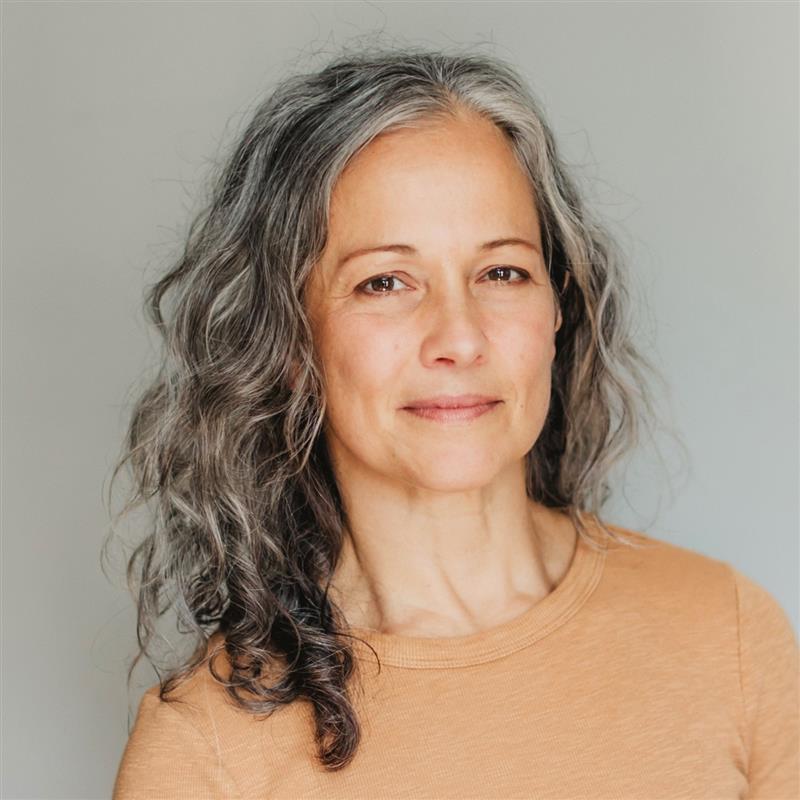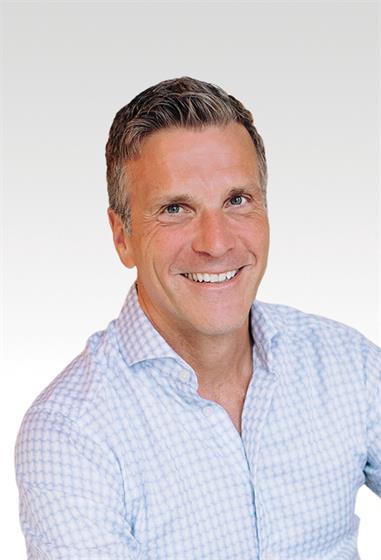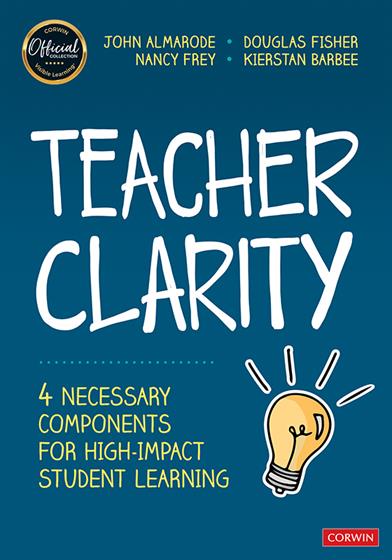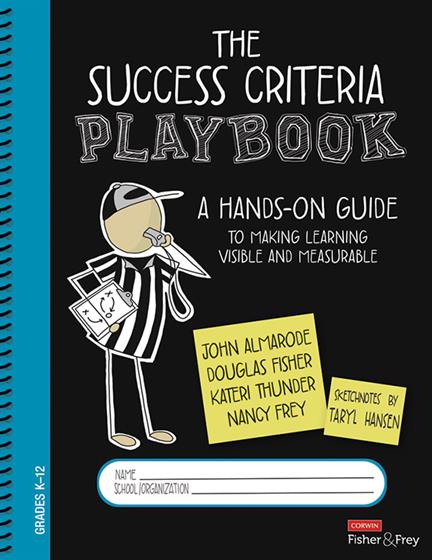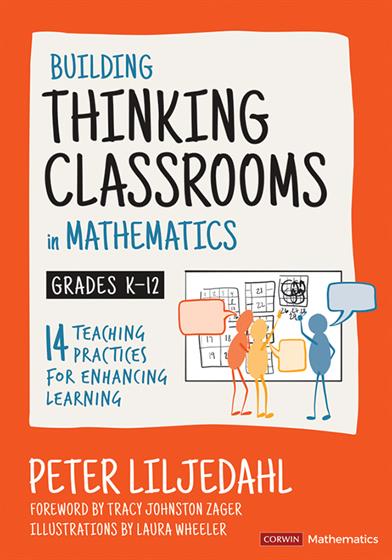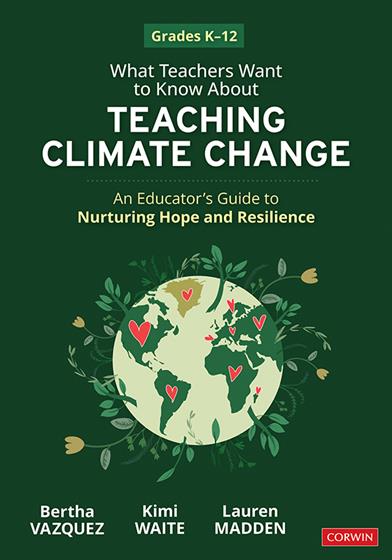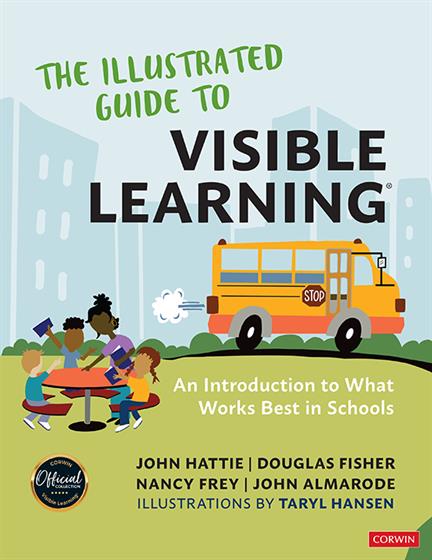JENNIFER GONZALEZ: That position, being a school leader, is incredibly isolating. All of a sudden, these people who, at one time,
were colleagues, all of a sudden now, you're the person at the top and you've become kind of the enemy, in a way. It's us versus
that person. And you no longer have any other colleagues in the building that are peers.
[UPBEAT MUSIC]
PROFESSOR: Welcome to Corwin's Leaders Coaching Leaders podcast with hosts Peter DeWitt and Michael Nelson. This
podcast is from education leaders for education leaders. Every week, Peter, Mike, and our guests get together to
share ideas, put research into practice, and ensure that every student is learning not by chance, but by design.
PETER DEWITT: Jennifer Gonzalez, welcome to the Leaders Coaching Leaders podcast.
JENNIFER
GONZALEZ:
Thank you so much, Peter. I'm happy to be here.
PETER DEWITT: I have been very excited. Mike knows that I've been very excited about this interview because I have been a fan
of your work for a very long time. And I think you know that already because I've tweeted you and everything
else. So I'm going to try not to gush.
So when we jump into this, your podcast is wonderful. Your blog is fantastic. Your social media is great. You have
this way of just being so spot on and direct with such great information, and it's so engaging.
And one of the questions that I have, which I'm sure you've been asked many times before, where did the name
Cult of Pedagogy, actually, how did that come to be? Because I love that name.
MICHAEL
NELSON:
Peter, I think it's the first time she's been asked the question. [INAUDIBLE]
[LAUGHTER]
PETER DEWITT: I'm so sorry, but I have to know.
JENNIFER
GONZALEZ:
I haven't been asked it a ton.
PETER DEWITT: Break that down for me.
JENNIFER
GONZALEZ:
OK. So it came from two places. One is that when I was a public school teacher, when I was a middle school
teacher, I felt like one of very few people in the building who really used to geek out a lot on teaching. And I used
to want to talk about strategy and new things we were learning. And I'd get a little excited at PD. And everybody
else was just like [GROANS] And I just always felt like I wished I could find more people that were equally as into
it. So that's where the cult mentality piece of it comes from, that I wished that I could start something that would
attract other people who were equally enthusiastic.
And then there's the, well, it started as just an expression, the phrase, Cult of Personality. But then the band
Living Color made it a song, which I was probably 20 years old when that song became popular. So I've always
known that song. And somehow, I don't know, it's what that phrase means, Cult of Personality, just this sort of
worship of a thing or of a person. But in this case, I didn't want it to be a thing. I wanted it to be this worship of
pedagogy. [CHUCKLES]
And I love the word pedagogy. And I didn't hear it often enough. And I thought, well, this is a way to force people
to either say it or say it awkwardly like my mom. She'll be like, I saw your post on the cult. And I'm like, you can
try, mom. You can say the word.
[LAUGHTER]
So that's it. It's not really a story there.
PETER DEWITT: Oh, no, I think there's an amazing story there, actually. I love "Cult of Personality" by Living Color. So it's like
you're speaking my language right now.
JENNIFER
GONZALEZ:
[CHUCKLES]
MICHAEL
NELSON:
You totally made me think of my oldest granddaughter, Maisie, because, P.S. Peter knows, he went to coffee with
us. He was on the West Coast about a week and a half ago. And Jennifer, her new word is mahogany.
[LAUGHTER]
JENNIFER
GONZALEZ:
Oh, that's a great word.
MICHAEL
NELSON:
When she takes out her colors, she says, oh, poppy, here's mahogany. So you just need to tell your mom, mom,
it's pedagogy. So come on.
JENNIFER
GONZALEZ:
[LAUGHS] Yes.
MICHAEL
NELSON:
If a two-year-old can say mahogany, mom, you can say pedagogy.
JENNIFER
GONZALEZ:
Crayola was always so great with the color names. Nowhere else in the world did I ever see the word burnt
sienna then on the crayon.
MICHAEL
NELSON:
That's the next one. She's like, oh, poppy, this is burnt sienna. It's different than mahogany because it has little
less red tones. It's like, OK, [INAUDIBLE].
JENNIFER
GONZALEZ:
Who is she? I love her. She's two?
MICHAEL
NELSON:
She's two. Yes.
JENNIFER
GONZALEZ:
Oh, she's going to be a genius.
MICHAEL
NELSON:
Yep.
PETER DEWITT: I'm telling you, I was there when she said mahogany. And I was just going, this child is brilliant.
JENNIFER
GONZALEZ:
Yes. Yes.
MICHAEL
NELSON:
And I think we can end the podcast because I believe that's what our listeners wanted to know, was they wanted
to know about Mike's oldest granddaughter. So let's move back on track, Peter. Let's get into this interview. I
have to-- I don't know you as well as Peter does. But I have to say, I love when you feel like friends of friends are
connected. And the people that you've interviewed are heroes and people that we've had into our district when I
was superintendent and it was like, oh, we are kindred spirits. We are friends of friends on people. And so that's
fantastic. I love that.
But I think your mind as a teacher and as the website is just beyond brilliant in terms of I love how you've
organized your website. And I know that's that-- but that's an instructional tool. You use your blog as the core.
And then you have your podcast. And then you have your Edutips. How does your mind think? Because that's all
instruction.
When we have leaders thinking about their schools, their districts if they are superintendent, but you have
nested all of these things. I know that might be a new question for you. But how does your mind think about
that? And then reference it to how building principals or superintendents might nest their learning so it's always
there, the tools are always there in front?
JENNIFER
GONZALEZ:
I think I try to think about what would a brand new person experience when they're looking when they first show
up on the site. And I honestly think I could be doing much better at helping people get to the thing that they
need. So especially now I've got 12 years worth of content on there now. And I know everything that's there. I
mean, we've got people who are 23 years old who are freshly out of college and I'm just thinking, there's no way
that they've seen that cool thing that I wrote in 2017 and how do I help them find that?
So to be transparent, too, in maybe 2016, I actually hired a marketing company to help me redesign it because I
was just using a regular WordPress template. And I knew that I wanted to make it a proper website. So they
looked at my stuff and said, we feel like you need buckets that you can put things into because at that time, I
just kind of-- I don't even know. I must have had a column along the side that just had a list of categories or
something. And they helped get it visualized back then. And I've just stuck with what they did. But the Edutips
have come along since then.
The Edutips came along honestly because that's what I used to do when I taught teachers at the university level,
I would just give them like one little teaching tip every day. And I thought, these are super quick. I can get these
out there in smaller bites for people that don't feel like listening to a whole podcast. And a lot of them come from
podcast interviews that I did where a person just gave one really cool idea and I thought, that's going to get
buried in this hour-long interview. I need to surface it out of there so that people can just get that one thing.
MICHAEL
NELSON:
I just think it's brilliant learning for a principal and a superintendent. You didn't recreate. You took things that you
had but you pulled out little pieces. You keep reinventing-- not reinventing them, but reusing them and
rehighlighting. Truly, I just think it's a huge leadership [CHUCKLES] tool. That structure in itself, what you did and
how you did it, you could write a whole class on because that's what we want to have occur, I believe, across
school buildings and districts.
But your four-minute intro to the website, here's how you use a website. OK, I've never seen that. And listeners, if
you've not gone to Jen's website, you need to and explore that. I was doing it. My wife was knitting. And she's
like, no way, that's really cool.
JENNIFER
GONZALEZ:
[CHUCKLES] Well, where I did that? And I need to redo it because I feel like I'm very sweaty in that video.
[CHUCKLES] But I made that because I also have a teacher's guide to tech and it used to be a PDF that I did
every year and now we have converted it to its own separate website. But one of the features on that site that is
really important to me is that for every tool we describe, we also embed a video that when we go out looking for
videos that are ideally less than two minutes long and really show the tool in action, help you to understand.
Because we'll go to websites sometimes and we're just like, I don't understand how this tool works or how this
application works. So the explainer video is such a key part of any platform's marketing of just show me how this
thing works. And so I realized, probably just like a year and a half ago, I thought, I need an explainer video for
my own website. There's a lot there that can also help the new person kind of. Yeah.
MICHAEL
NELSON:
And that's a leadership tip right there. Principals, superintendents, we need explainer videos regarding whatever
topic.
JENNIFER
GONZALEZ:
Yes! Well, there's the in real life stuff. But also, every school now has a pretty robust digital platform. And I know
that as a parent of three kids, it's sometimes a lot of work to go to these school websites that you're just like, I
just want to know what time the bell is going to ring and it takes me 15 minutes just to find that information. And
so having a little bit of help navigating those sites would be fantastic.
PETER DEWITT: I'm feeling two things right now, Jen. Number 1, I'm feeling like I'm going to get an email in about two hours from
Mike--
MICHAEL
NELSON:
No, it's already written. I just haven't pushed send until after the podcast.
PETER DEWITT: With a list of things that I'm going to have to do on our website. So thank you in advance for that because I can
already tell by the look on his face, as he's looking over, there's a glimmer in his eye that he's like, oh, I'm
thinking I'm going to have to send Peter an email and surprise him in a few hours. So I just want to give a heads
up. I know it's coming.
MICHAEL
NELSON:
Let's try and be like Jen.
[LAUGHTER]
PETER DEWITT: But number 2, I want to go back to when you said you hired the marketing company because I think that is
actually fantastic. Because one, it clearly works. But two, I think it goes to the whole idea of in schools, we have
coaching. Whether we're talking about instructional coaching with teachers or Mike and I do a lot of leadership
coaching, we coach each other, those kind of things.
I think what it goes to show is as amazing as you are, and I value your work, you also looked and said, I need
some help tweaking this and working it out. And I think that that's really important for people to understand
because too often, we don't go looking for help because we're confident that maybe the way we're doing it is just
the right way to do it. And your story illustrates the fact that that's really important.
I will present on my own or Mike will present on his own. But when we actually present together, it's fantastic
because when I'm maybe the one delivering the content and using the protocol, he's coming to me to give me
feedback at the same time. So I think your story illustrates that. And the other thing I wanted to say is when it
comes to coaching, you actually you interviewed Elena Aguilar.
JENNIFER
GONZALEZ:
She's such a genius. Yeah. [EXCLAIMS]
PETER DEWITT: I know. I have her book right behind me. Your conversation with her really touched on what human needs to
thrive-- humans need to thrive. From your perspective, how can educational leaders better meet the emotional
and professional needs of their teachers while maintaining that whole piece about high expectations? How can
they manage to do both?
JENNIFER
GONZALEZ:
Gosh. I just think that with-- this is what I've observed, because I've never been a school leader. But what I've
observed is that the ego seems to get kind of fragile sometimes. And the least effective leaders, is that they let
that--
I think that that position, being a school leader, is incredibly isolating. All of a sudden, these people who, at one
time, were colleagues. All of a sudden now, you're the person at the top and you've become kind of the enemy,
in a way. It's us versus that person. And you no longer have any other colleagues in the building that are peers.
So I think that can make a person feel very defensive.
And so I've seen in some leaders this tendency to want to come out strong, and powerful, and be like, we're
going to have these-- and not appear weak. And then that can be really alienating for staff. So I think just an
awareness of that dynamic could be one thing.
I think another is I feel like this is the magic formula for almost any role a person has in life, whether it's as a
school leader, a parent, a spouse, a sibling, a coworker, is just being really open to feedback, and seeking it, and
then learning how to deal with the feelings that come up in you when you get it because that's the hard part.
[CHUCKLES]
Nobody likes to hear anything critical about themselves. It's not fun. But it always is an opportunity for growth.
And I think that if you have a staff who really believes that you are open to feedback and that you will do
something with that feedback once you get it, I feel like that is the foundation for all of those things.
Because meeting the needs of any given staff, it's going to be a unique set of needs for all these different
individual people in different schools. And so unless you can get the information and the feedback from your
unique set of people, any book that's written by Todd Whitaker or anybody out, it's all going to be great but it's
not necessarily going to apply to that particular group.
One person, and I assume she's on your radar, but if she's not, she's got to be, is Shane Safir, who wrote the book
The Listening Leader. And really, I think she has got probably one of the best ways. You're smiling so I'm
assuming that is a big yes. But she's so good at articulating what it looks like when you can just really listen to
your people and figure out what they need. So it isn't a matter of like, do this or do that. It starts with that
listening, that deep listening and having time to do it.
PETER DEWITT: We're smiling because about 30 minutes ago, we finally found a date where we could all meet. So we're
recording [CHUCKLES] our podcast with her in two weeks. So it's really funny that you just mentioned her name.
So now we're like, oh, this is great. So we definitely chose the--
JENNIFER
GONZALEZ:
Go to Shane. [CHUCKLES] Go to Shane and all of the team-- she works with so many brilliant people. She's
partnered with so many brilliant people who really, I think, have a pathway that would be a great one to follow.
PETER DEWITT: Yeah. And I really appreciate what you said, too, about, especially people who are new to leaders, we always find
that the first thing they want to do is make their mark so they go in and change things, as opposed to-- I was
fortunate when I became a principal, for the first year, I just wanted to hear what people were saying and figure
out where I fit in. As opposed to making people feel like they had to fit in with me, I need to know how do I fit in
with them. And I know Mike did the same thing as both a building principal and a superintendent. So it's really
good insight.
And the other part is that us versus them piece. It's really important for leaders to understand how to break that
down and collaborate through those kind of pieces. And we always talk about doing it through a shared
understanding and how do we engage in joint work because that us versus them mentality is not helping
anybody. And it hasn't.
JENNIFER
GONZALEZ:
And I also think, though, that the leaders themselves need to take care of themselves. I think there needs to be a
recognition that anybody in leadership still is a human being with all these needs and vulnerabilities and is
carrying the weight of so much.
Another name that I would hope is on your radar, too, is Danny Bauer, who does-- yes. And that's the piece that I
think he's really good about, is tapping into the emotional state of the leader themselves, and forming more
partnerships with other leaders, and just getting together, and talking, and networking so that you're not doing
this work alone.
PETER DEWITT: Yeah, we know Danny very well, so that's great.
JENNIFER
GONZALEZ:
[CHUCKLES]
MICHAEL
NELSON:
Danny is a great, great thinker and love to have a meal with him. And I know I always walk away with my head
full of [INAUDIBLE] processes. But as you were talking, I have to say in exploring and preparing for this.
JENNIFER
GONZALEZ:
Good book.
MICHAEL
NELSON:
[INAUDIBLE] reminds me of Peter Johnson's book. And I have to tell you that when I first became a principal,
Shelley Harwayne, who exquisite writer. And she opened the Manhattan new school. And in her book, she often
puts the words exquisite language together. We, as educators, have an obligation to use exquisite language
when we're working with our students, when we're working with each other.
And it's from that that I explored Peter's first book that came out 25 years ago. And we had him booked to be our
opening keynote speaker, probably about 22-23 years ago in Enumclaw. And he didn't make it because the flight
wasn't there. But he was so incredible to work with. But our entire staff really studied his work and the language.
The book is written for the language that we use with kids. But we took it of the language that we use with each
other, and how we operate, and the culture in which we set. And so it's both listening and hearing of not only the
teachers providing feedback, but the reciprocal piece of how do we work together as adults within this. Yes, I am
designated as the leader, but how do we build that?
And in his new book, he adds the part of social emotional learning piece into it. And I just am curious is, how do
you learn from these individuals? And then how do you incorporate, like, Peter's podcast into your work, into
other interviews? Tell me a little bit about how your mind thinks when you build your cult?
[LAUGHTER]
JENNIFER
GONZALEZ:
I'm very fortunate now that I've built a big enough audience that most of the interviews that I do come to me. A
lot of times they will come directly to me and say, I wrote this book. Can I be on your podcast? And a lot of times
I have to say no because I don't think it'll serve the audience, or it's just not a fit, or we've already kind of
covered that topic or whatever.
And I had already talked about Peter's book several times before he was ever on my podcast. So I think maybe
they contacted us about the new edition. And I was like, well, duh, I've already talked about your book so, yeah,
come on, let's do it.
But in terms of what I learned from them, the information that I gained from a single interview can make its way
into a keynote that I give or a training that I do. I've been working for a year now on an online course called
Mastering the Lesson Plan. And I feel like it'll never be done because every time I do another interview, I think,
oh, I should incorporate some of that. That's really good. That should go into it also. That's why I'm making it a
course and not a book because I can keep changing it.
But just like our conversation, I will get introduced to other people's work through conversations with one person.
And I don't know. I think it's kind of amazing because the work that we are trying to do is so complex and so
nuanced. And it's what I always loved about teaching, which is that you're never going to master all of it because
there's so much to it. There's so many ways you can get better at it that it takes this many people to continue to
fine tune and master this incredible art of helping other people grow. I mean, that's kind of what we're all doing,
whether we're in leadership, or coaching, or teaching actual kids, or whatever. So I don't know.
And I think probably the best feeling is when I-- the names that I've been saying to you all and you're nodding
and like, yeah, we already know them. It's when I know that friends of friends are there already, and we're all
discovering each other's work, and then building on it. When I read one person's book and I see them quote
another person in their book, and that other person has become a footnote in their book, And. I'm just like, yes,
all of these worlds are colliding, according to George Costanza.
[LAUGHTER]
It's like, yeah. So I don't know. When you say how does my mind work. It looks like all of these little pieces of
paper all over my desk that are ideas for future things that I feel like I'm always behind. Always. But I guess the
good thing about that is that it's sort of like the sand and the oyster. Not all sand becomes oysters-- or not all
sand becomes the pearl. But eventually, some of it makes it into the oyster [CHUCKLES] and it becomes the
pearl. But there's a lot of sand. [CHUCKLES]
MICHAEL
NELSON:
Yeah, I completely am there. You made me think of the art of teaching cooking, the movieJ ulie & Julia. And in a
cookbook, you can work your way through each recipe. But I hear what you're describing, education, and
teaching, and learning, and leading is much more complex and integrated. And so we can't work our way through
your adjectives. We need to be thinking about how the adjectives are just right way to work with this particular
group of students at that moment because we know that's what's going to unlock learning.
So I'm thinking about what our movie could be? Mastering the of teaching and learning or something, an
integrated movie. And I'm sure it would be an Oscar-winning movie.
JENNIFER
GONZALEZ:
[CHUCKLES] This is why whenever people say, ooh, AI is going to replace teachers, I'm just like, it can only
replace certain components and just make it a little faster for us. Nobody is ever going to be able to-- no machine
is ever going to replace the wisdom and the experience that a really, really good educator can apply to the job.
PETER DEWITT: Yeah. And I see AI as untapping that creativity when you're using it in the correct way. As we close out, I want to
go back to one thing that you just said, which is you always feel like you're behind. And I think that there are lots
of educators that feel that way. We're always talking about--
I feel like people feel very reactive versus proactive because they always feel like they're behind. They always
feel like they're in a rush. And that's part of the issue, is that maybe it's the meditative side of me, we need to
slow down. How do we slow down? So I would love to just ask as the final question, when you are feeling like
you're behind, how do you turn that into inspiration to find that one place to go? I hope that question makes
sense.
JENNIFER
GONZALEZ:
I do think that it comes a lot of times from slowing down and also not thinking about the forest and just thinking
about the tree. And just saying, listen, if you think about the forest all the time, you're going to always feel
scattered. So just focus on this one tree.
And sometimes I feel like I'm dragging myself through something to try to get it finished. And I will really try to
tap back into what originally made you want to do just this one thing, what got you excited about it, and think
about the person on the other end receiving this and having it help them. And that sounds super-- it sounds like
it could be kind of corny, but that can give me that extra little boost to finish it, basically, and not let myself get
overwhelmed and kind of paralyzed by that overwhelm.
And it's that starfish. If you save the one starfish, you know you've done something. And so it's like if I produce
this one bit of knowledge and wisdom, and get it out there, and that reaches somebody, that's way better than
halfway doing a whole bunch of other things.
And I do think when you mention meditation, I think mindfulness helps, any kind of slowing down and just
breathing and focusing on the moment. Because the moments just keep flying by and we have to really pay
attention because life is short. It kind of seems like we're all roughly in the same age group. But you start
realizing, I don't have that many more years left. So I've got to make the most of these.
PETER DEWITT: Yeah, in fact, I have it tattooed on my arm, to be honest with you. So there you go.
JENNIFER
GONZALEZ:
What does the tattoo say? [CHUCKLES]
PETER DEWITT: It just says, there will be plenty of time. And it's a reminder that there isn't.
JENNIFER
GONZALEZ:
Yeah. Nice. [CHUCKLES]
PETER DEWITT: Yeah. So Jennifer Gonzalez, thank you so much for being on theL eaders Coaching Leaders podcast. This I have
been looking forward to for a very long time. So I really appreciate it. For the one person on Earth that doesn't
know where to find you, where can they find you?
JENNIFER
GONZALEZ:
It is all one word, CultofPedagogy, P-E-D-A-G-O-G-Y, dot com. And that is the hub of all of my other places that
I'm existing. So that would be the place to start.
PETER DEWITT: Please, please, please go there. And besides the fact that I'm a little upset with you because I'm going to get that
email from Mike in about an hour and a half now telling me all the things that I need to do--
[LAUGHTER]
Thank you.
JENNIFER
GONZALEZ:
Thank you. This has been really fun.
[UPBEAT MUSIC]
MICHAEL
NELSON:
Oh, my goodness, I absolutely loved the conversation that we just had with Jen. She is an all-star educator,
teacher. And many of her blogs and things are for teachers, but, Peter, they can be applied to every leader at
every level, don't you think?
PETER DEWITT: I do. One of the things that I kept thinking about, because that's really the first time I've actually been able to
have a conversation with Jennifer. We've emailed back and forth and done stuff on social media. But that's the
first time I've really met her.
And I have to admit, when you admire somebody, and I admire her work greatly, I have for a decade or longer,
you're always worried about meeting the person being like, oh, that was a letdown. Not at all. She is exactly who
I was hoping she would be. And I know that maybe that doesn't matter.
But I think what's great is sometimes you meet people and they have kind of an ego and stuff. And Jen was just
completely engaging and really enjoyed that conversation a lot. And I think we're walking away with some really
important nuggets just in our own work, which is also very powerful when we have an interview that does that.
MICHAEL
NELSON:
Yeah, exactly. You and I are in the middle of writing a new book together. And we're really just studying the
connection between the skills and ability to do something and the confidence that one needs, a leader needs or a
teacher needs in order to do that work.
And in studying the word confidence, there's so many things that fall under that in terms of efficacy and the
decision-making of the teachers. And she blended all of that together for me in this interview. You know how it's
just right learning for you when you hear something because you've been studying it and researching it?
To me, she blended the complexity of an educator, of you're always working and it's about the connections. And
it's both the passion, and the desire, and the beliefs, and the confidence with the ability to do the work, the skills
and the knowledge. So I just thought she was pretty remarkable.
PETER DEWITT: Yeah, she definitely has the research background. I'm glad that I asked her about where did the Cult of Pedagogy
come from because--
MICHAEL
NELSON:
That was great.
PETER DEWITT: I feel like we are all kindred spirits in that way because I think we geek out on education. And she's got a great
research background, but she makes things extremely practical. And she gives people very practical steps and is
very good at explaining how to use them. That's where I think a lot of her talent is, too, is that she can easily
explain how to use them. And I value the conversation. The only thing I'm going to say is I'm going to correct you
a little bit. We're not halfway through the book, Michael. We're more than halfway.
MICHAEL
NELSON:
We're more than halfway, listeners. We're more than halfway through our book. So by the time this airs, should
almost have that first draft done. So we're pretty excited about it, as you can probably tell. We're bantering back
and forth about it.
But I thought Jen was great. And I love that she just said, yeah, my mom says, I went on and I read your blog on
the cult. You know the cult of? And she's like, mom, you can say pedagogy. It's OK. And that was a great moment
for me. We're real. It's just real. We're real people.
PETER DEWITT: Well, yes. And I love that you talked about Maisie, and the whole mahogany piece because it blows me away
even though it's been a week and a half since we had the conversation, hearing a two-year-old say mahogany is
just kind of amazing. [CHUCKLES]
MICHAEL
NELSON:
Yeah, that's for sure. There may be a blog in our future that's called It's Mahogany.
PETER DEWITT: [CHUCKLES] That's right. Maybe there is. Oh, Michael, very good to be in the season. What a fantastic season it
is. For those of you that are watching us on YouTube, please give us like and maybe even a comment. And for
those listening to us on your favorite podcast channel, please give us a like there, too.
But we're always looking for your feedback. Jen was talking about the importance of feedback and that's
something that we're always looking for from you. So thank you again for listening to the Leaders Coaching
Leaders podcast. And please come back because we have some amazing interviews this season.
MICHAEL
NELSON:
It's going to be a great season. Or it is a great season. So here we go.
PETER DEWITT: All right, Michael, see you soon.
MICHAEL
NELSON:
See you soon.
[UPBEAT MUSIC]

